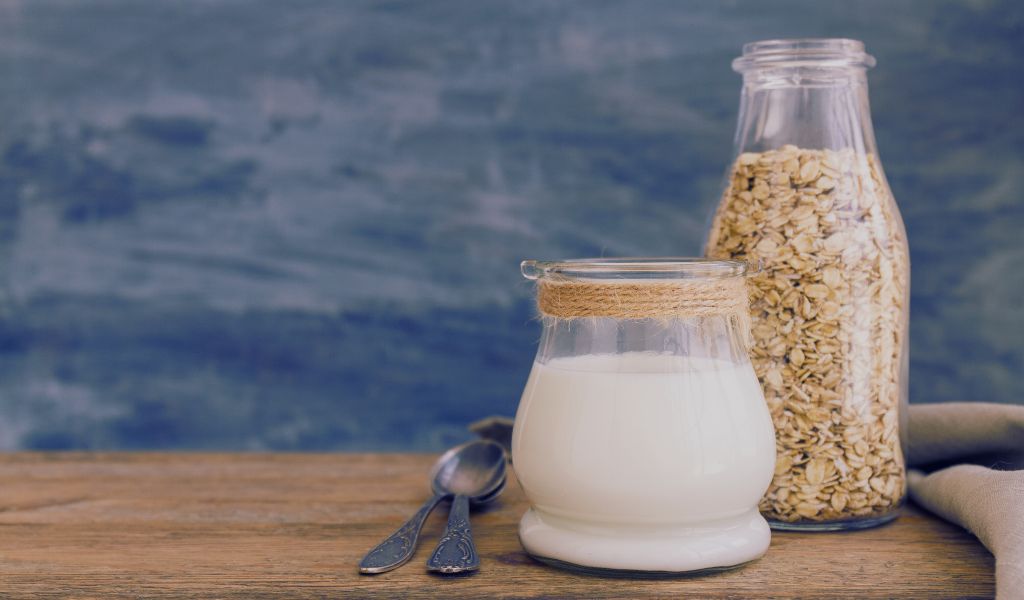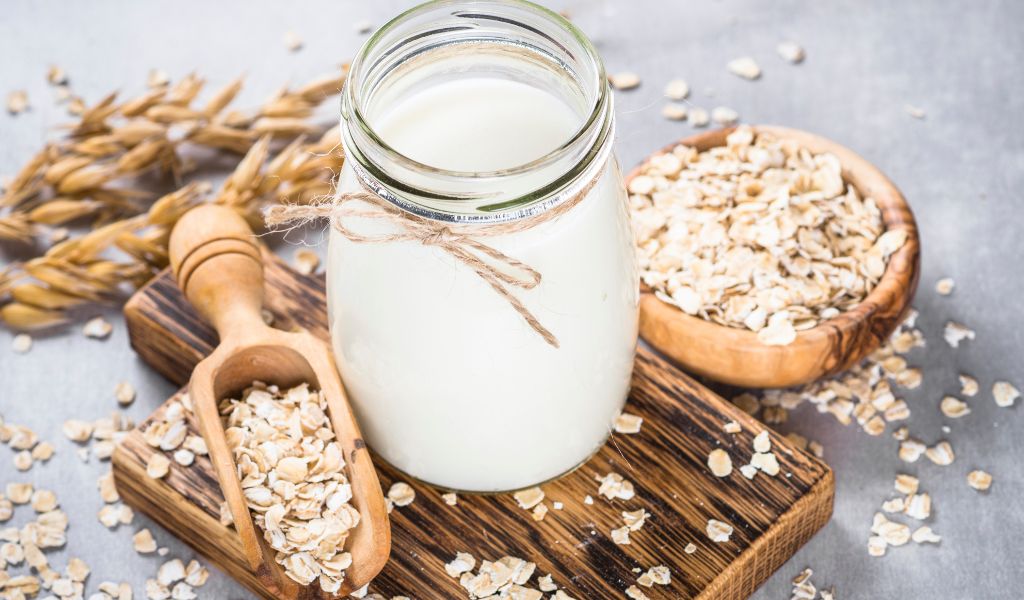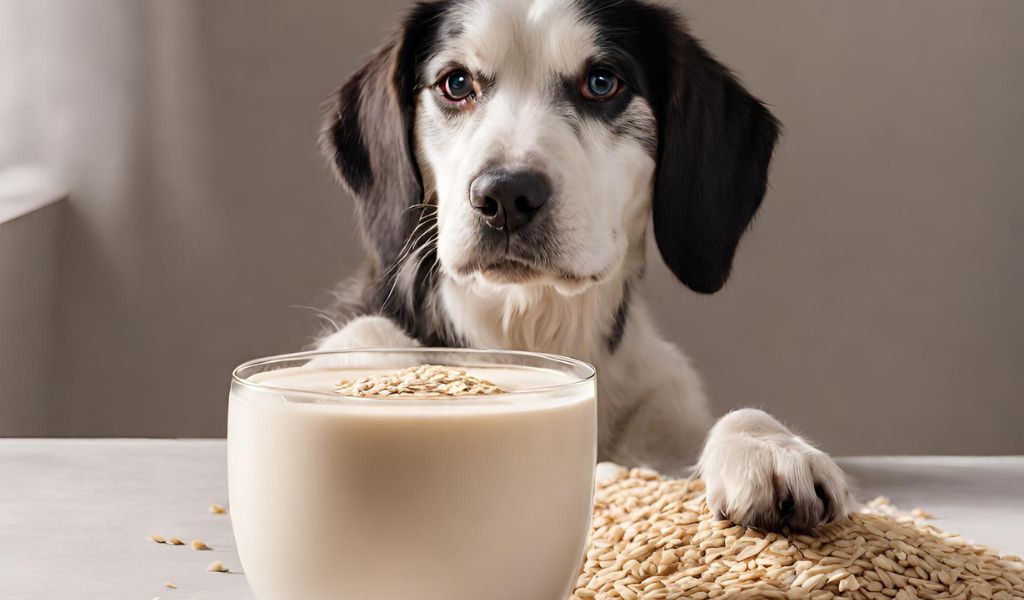Oat milk is a popular dairy-free substitute. It is made from oats, water and sometimes some added nutrients.
It is processed and produced according to various processes and formulas and can be a pleasant drink for your dog.
Dogs can drink oat milk and it makes a special treat for most dogs who enjoy the taste. As it is full of nutrients it can be a useful drink for dogs that are on a limited diet or can be used as an occasional drink to add extra nutrition into your dog’s diet.
Can dogs drink oat milk without problems?
Yes, but it’s essential to offer it in moderation and observe for any adverse reactions.
Oat milk is non-dairy and typically safe for dogs, especially those who may have lactose intolerance.
However, it’s crucial to ensure that the drink that you’re providing is free from any added sugars and artificial sweeteners, especially xylitol, which is extremely toxic to dogs.
Is oat milk safe for dogs?
Dogs don’t need milk once they are weaned.
But if your pooch loves the taste then a little non-dairy option, like oat milk, is fine for many dogs as an occasional treat.
Remember, oat milk should only be given to your dog in moderation.
It is not toxic but your dog might not be able to digest its excessive amount. This may cause some unpleasant side effects like upset stomach, diarrhoea, or vomiting.
The bottom line?
Moderation is the key.

Lactose intolerance
Dogs, like some humans, can be lactose intolerant.
Oat milk is a lactose-free alternative to cow’s milk, which can make it a good option for dogs with lactose intolerance.
Potential allergies
Dogs can be allergic to oats, so it’s important to monitor your pet for signs of an allergic reaction after giving them oat milk for the first time.
The risks of oat milk for dogs with sensitive digestive systems
Some dogs may have difficulty digesting oat milk due to its high carbohydrate content.
Dogs with sensitive digestive systems may experience diarrhea, vomiting, or other digestive issues after consuming oat milk.
Pros
Cons
OAT MILK FOR DOGS – SHOULD I LET MY DOG HAVE IT?
While dogs can consume oat milk without the typical concerns associated with lactose intolerance, it’s not a necessary addition to their diet.
Dogs get the majority of their nutritional needs from their regular food, and their primary source of hydration should be water.
Here are a few considerations if you’re thinking about giving this to your dog:
Nutritional Needs: Dogs have specific nutritional needs that are typically met through their regular dog food.
Oats do not provide any essential nutrients that your dog isn’t already getting from their balanced diet.
Calories: It’s high in calories, and giving it to your dog regularly could contribute to unnecessary weight gain if not accounted for in their total daily caloric intake.
Additives: Some varieties contain additives, sugars, or artificial sweeteners (like xylitol), which can be harmful to canines. Always check the label thoroughly.
Allergies or Sensitivities: While it’s less common, allergies and sensitivities can occur.
Introducing something new should be done cautiously and in small amounts to monitor for any adverse reactions.
If you decide to give this, ensure it’s in small amounts and only on an occasional basis.
If you have any doubts or if your dog has specific dietary requirements or health issues, it’s best to consult with your veterinarian before introducing new foods or drinks into their diet.
What is oat milk and how is it made?
Oat milk is a plant-based alternative that is made from whole oats and water.
To make it, the oats are soaked in water, blended, and then strained to remove any solid particles.
Some oat milk products may also contain added vitamins, minerals, or sweeteners.
The nutritional value of oat milk for dogs
Calories: Oat milk is relatively low in calories compared to the dairy option, with around 120 calories per cup (240 ml) of unsweetened oat milk.
Carbohydrates: Oat milk is a good source of carbohydrates, providing around 16 grams per cup.
Most of these carbohydrates come from naturally occurring sugars in oats, with only a small amount coming from added sugars in flavored varieties.
Protein: Oat milk is not a significant source of protein, providing only around 3 grams per cup.
Fat: This plant based product is typically low in fat, with only around 5 grams per cup. However, some varieties may contain added oils to improve texture and flavour.
Vitamins and minerals: To improve nutritional content vitamins and minerals are often added.
Most commonly, it is fortified with calcium, vitamin D, vitamin A, and vitamin B12. It is also a good source of phosphorus and potassium.
Fibre: Fibre levels are high at around 2 grams per cup.
This fibre comes from the oats used to make the milk and can help promote healthy digestion.
Benefits of oat milk for dogs
Let’s have a look at some of the benefits for dogs:
Oat milk is low in allergens and irritants. Many dogs are lactose intolerant and oat milk is free of many types of allergens found in dairy milk.
Oat milk is a good source of fibre, making it great for dogs with bowel irregularity issues.
It is often enriched with nutrients including calcium, potassium, iron, and vitamins A and D.
Great for your dog’s bone health because it contains a plethora of nutrients, minerals, and antioxidants.
It is safe for dogs with gluten or wheat allergies.
Oat milk helps to prevent anaemia and boost the immune system of your dog.
Oat milk as a nutritious and low-fat alternative to cow’s milk
Oat milk is a good source of vitamins and minerals, and is lower in fat than cow’s milk.
It can be a good alternative for dogs that are lactose intolerant or have trouble digesting cow’s milk.
The potential for oat milk to help with digestive issues
The fibre in oat milk can help regulate a dog’s digestive system. It may be beneficial for dogs with constipation or other digestive issues.
Oat milk as a source of vitamins and minerals for dogs
Oat milk contains vitamin D and calcium, which are important for bone health in dogs. It can also be a good source of other vitamins and minerals.

Few considerations before giving oat milk to dogs
Dogs are like children and they depend on us for everything.
It is important to understand that as a dog owner, you are responsible for the health and wellbeing of your dog.
Here are a few things that you must look at before giving oat milk to your pooch:
Before feeding your dog with oat milk, you need to make sure your furry friend is not allergic to any of the ingredients in oat milk.
Remember to control the amount of oat milk your dog drinks. You can consult your vet for a better idea of the amount of oat milk that you add to your dog’s diet.
Make sure to choose unsweetened oat milk, as some varieties may be high in added sugars.
Check out the ingredients carefully.
Some brands contain Xylitol as a sugar substitute.
It can cause life-threatening issues such as low blood sugar and liver injury in dogs.
Organic, natural Oat Milk should be the only type of oat milk that you give.
Amazon have some good organic choices.
How make oat milk for your dog
It is really easy to make your own oat milk for your dog and, if you do it yourself then you can be certain that it doesn’t contain any sugars or additives.
To make oat milk for your dog simply:
Put 1 cup of rolled oats and 4 cups of water into a blender and blend on a high setting for about 45 seconds.
Pour the contents of the blender through a fine towel into a jug or other container.
You can use coffee filters to strain the milk, as long as the filter is fine enough to separate the liquid from the pulp.
It is that simple. This quick technique means that you can easily make small amounts of oat milk for your dog and you don’t need to be concerned about storing any excess.
How often can you give oat milk to dogs?
Oat milk can be given to dogs occasionally and in moderation, but it should not be a regular part of their diet.
Dogs primarily require water to stay hydrated, and their nutritional needs are typically met through their regular dog food.
If you choose to give oat milk to your dog, it should be viewed as a treat and thus should adhere to the general guideline of treats making up no more than 10% of their daily caloric intake.
Can dogs drink oat milk that is flavoured?
If you do decide to give oatmilk to your dog then you should be careful about flavoured options such as vanilla and similar.
Many flavoured milks contain high levels of sugars and other additives that could be harmful for your dog.
Certain artificial sweeteners, such as Xylitol, can be found in a wide range of ‘human’ foods and can be very dangerous to dogs.
The VCA have a good article about Xylitol and the risks to dogs here.
How much oat milk should I give to my dog?
It’s important to remember that adult dogs do not need milk or any other alternative such as oat milk.
Water is always the best option for a dog.
However, we all like to treat our pets from time to time and this is how you should view oat milk and how much – from time to time.
An occasional drink of oat milk will provide your dog with a nice treat that he will enjoy.
Combining oat milk with other foods for dogs
Oat milk can be combined with other foods to make a nutritious treat for your dog.
Consider blending it with fresh fruits or vegetables to create a tasty and healthy snack.
What is the best type of oat milk for a dog?
Organic oat milk is the only form that you should choose for your dog.
Check the ingredients to make sure that it contains no additives, sweeteners, sugars or artificial flavourings before you buy.
Choosing the right brand of oat milk
When selecting an oat milk product for your dog, choose a brand that does not contain added sugars or artificial ingredients.
It’s also important to choose a product that does not contain xylitol, a sweetener that can be toxic to dogs.
Other milk alternatives for dogs
While oat milk is a good alternative to cow’s milk, there are other milk alternatives that may
be more suitable for some dogs.
Almond milk for dogs
Almond milk is another plant-based milk alternative that can be given to dogs in moderation.
However, almonds are not easily digestible for dogs and can cause digestive issues if consumed in large amounts.
Coconut milk for dogs
Coconut milk is also a safe alternative to cow’s milk and is rich in vitamins and minerals. However, it is high in fat and should be given to dogs in moderation.
Goat’s milk for dogs
Goat’s milk is a good alternative for dogs that are lactose intolerant as it is lower in lactose than cow’s milk.
It is also rich in vitamins and minerals, but should be given to dogs in moderation due to its high fat content.
FAQs
Is oat milk safe for dogs?
Yes, oat milk is generally safe for dogs in small amounts. It is a non-dairy alternative that lacks the lactose that can cause digestive issues in some dogs. However, it should not replace water as the primary drink for dogs.
How much oat milk can I give to my dog?
Oat milk should be given in moderation, as an occasional treat rather than a regular part of your dog’s diet. The exact amount depends on the size and breed of your dog, but it is best to consult with your vet for personalised advice.
Are there any potential risks or side effects to giving my dog oat milk?
While oat milk is generally safe, it often contains added sugars and other additives that aren’t ideal for dogs. Some dogs may also have grain allergies, in which case it should be avoided. Always check the label for added ingredients, and monitor your dog for any signs of allergic reactions or digestive issues after consumption.
Can dogs drink oat milk as an alternative to cow’s?
Yes, dogs can drink oat milk as an alternative to cow’s, especially if they are lactose intolerant. Oat milk is lactose-free and can be easier on a dog’s digestive system compared to cow’s.
Final Words
It is undeniable that your dog will enjoy the taste of oat milk. Oat milk can be a safe and nutritious alternative to cow’s.
As a responsible dog parent, you must make sure that you satisfy their tastes safely.
The nutritional value in oat milk is very high and you should only give oat milk to your dog in small amounts to ensure that he/she doesn’t suffer any ill effects.
It is important to monitor your pet for signs of an allergic reaction or digestive issues after giving them this for the first time.
Additionally, it should only be given to dogs in moderation and in combination with a balanced diet.
Consider consulting with a veterinarian before adding oat milk or any other milk alternative to your dog’s diet.




